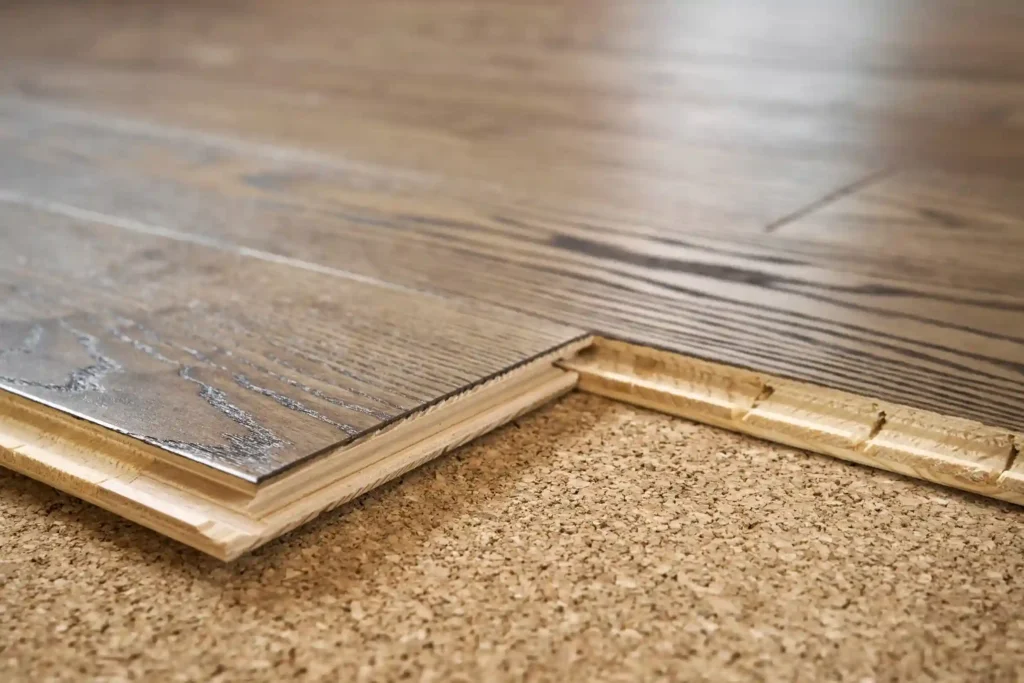Hardwood floors look amazing, but let’s be honest, they can get loud. Creaks, footsteps, and furniture scraping sounds can be pretty annoying, especially in apartments or homes with shared walls. But don’t worry! There are simple ways to fix these noise problems without replacing your floors.
If you’re looking for hardwood flooring in Brooklyn, you want something stylish and quiet. Here are some practical tips to reduce the noise on your hardwood floors.
Add Rugs to Absorb Sound
One of the easiest ways to reduce noise is by using area rugs or carpet runners. Rugs help absorb the sound of footsteps and minimize echo in the room.
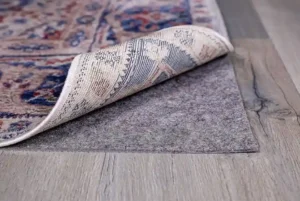
Here’s how to use rugs effectively:
- Place large area rugs in high-traffic rooms like the living room or bedroom.
- Use runners in hallways to reduce noise from footsteps.
- Add thick rug pads underneath for extra soundproofing.
The best part? Rugs don’t just reduce noise. They also protect your hardwood floors from scratches and dents.
Read More: How to Repair Common Vinyl Flooring Issues
Use Felt Pads on Furniture
Ever heard that loud scraping sound when you move a chair or table? That’s your furniture rubbing against the hardwood. Felt pads are a cheap and easy fix for this.
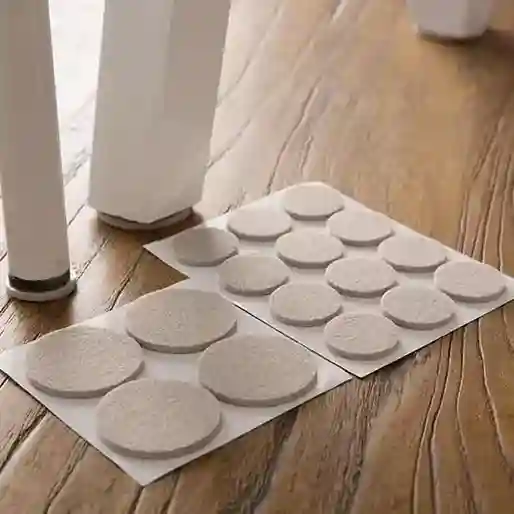
- Stick felt pads on the bottom of chairs, tables, and sofas.
- Replace the pads every few months to keep them effective.
- Use larger pads for heavy furniture to prevent damage to your floor.
These pads help reduce noise and protect your hardwood from scratches.
Fix Squeaky Floorboards
Squeaky floorboards are one of the most common noise problems. Luckily, you can fix them with some simple tricks.
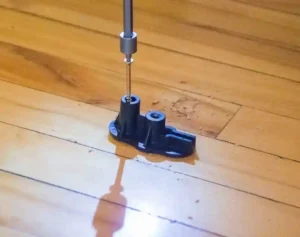
Try these methods to stop squeaks:
- Sprinkle baby powder or talc between the floorboards to reduce friction.
- Secure loose boards by adding screws or nails to hold them in place.
- If the problem persists, call a professional for help.
Squeaky boards can be a quick fix if caught early. Don’t let them drive you crazy!
Also Read: How to Cover Scuff Marks on Hardwood Floors
Add Soundproof Underlayment
If you’re planning to install new floors or renovate, consider adding soundproof underlayment beneath the hardwood. This is a layer placed between the subfloor and your hardwood planks to reduce noise.
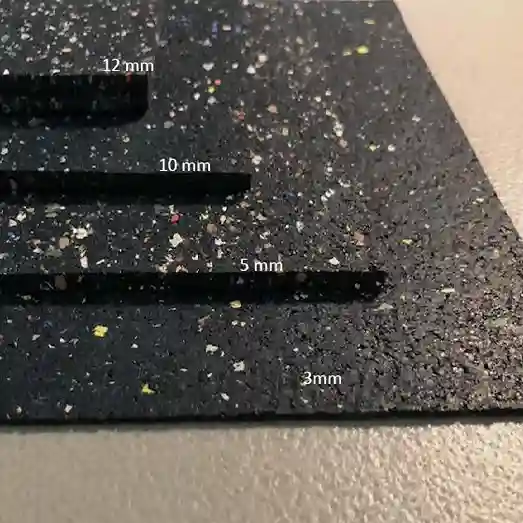
Popular types of underlayment:
- Cork underlayment – great for sound absorption and eco-friendly.
- Rubber underlayment – works well in multi-level homes and apartments.
While this option is more permanent, it makes a huge difference in noise levels.
Rearrange Your Furniture
Did you know that the way you arrange your furniture can help reduce noise? Big furniture pieces can block sound and reduce echoes in the room.
Here’s how to make your space quieter:
- Place large furniture like bookshelves and sofas against the walls.
- Add soft furnishings like cushions, throws, and curtains to absorb sound.
- Avoid too many hard surfaces in one area, which can cause echoing.
This simple trick can make your home feel quieter without spending extra money.
Use Heavy Curtains and Drapes
Windows can also cause echoes and noise in your home. Adding heavy curtains or drapes can help absorb sound and reduce noise from outside.
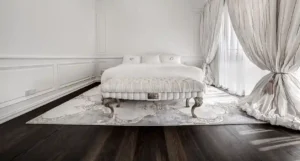
What to look for:
- Thick, floor-to-ceiling curtains work best.
- Choose heavy fabrics like velvet or thick cotton for better soundproofing.
- Layer curtains for extra noise reduction.
Curtains not only reduce noise but also improve your home’s energy efficiency.
Also Check Out: What is the Best Way to Clean Hardwood Flooring?
Change Your Footwear
The sound of footsteps on hardwood floors can be loud, especially if you’re wearing shoes with hard soles. One simple fix? Change what you wear around the house.
- Wear soft-soled slippers or socks instead of shoes.
- Ask guests to remove their shoes when they enter your home.
- Avoid walking barefoot, as it can create slapping sounds on the floor.
This small change can make a big difference in reducing noise.
Seal Gaps in the Floor
If your hardwood floors are older, there may be small gaps between the planks that cause noise. Sealing these gaps can help reduce creaks and improve stability.
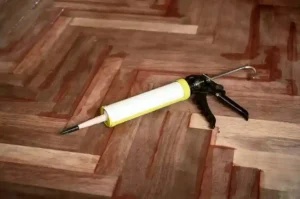
How to do it:
- Use wood filler to fill small gaps.
- Re-caulk baseboards to prevent sound from coming through the edges.
- For bigger gaps, hire a professional to ensure a secure fix.
Sealing gaps will not only reduce noise but also keep your floors looking great.
Add Floor Mats in Key Areas
Floor mats are another quick solution for reducing noise in specific areas, like entryways or kitchens. They help absorb sound and reduce the impact of footsteps.
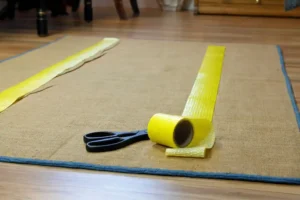
Where to use floor mats:
- Entryways – to minimize noise when people come and go.
- Kitchens – in front of the sink to reduce noise while standing.
- Bathrooms – to absorb sound and add comfort.
These small changes can make your home feel much quieter.
Why Noise Reduction Is Essential for Brooklyn Homes
In Brooklyn, many homes and apartments have hardwood flooring. It may look stunning, but it can be noisy, especially in shared living spaces. If you live in a multi-level building, reducing noise is key to keeping neighbors happy.
Whether it’s footsteps echoing or furniture scraping, noise can travel easily through hardwood floors. Following the tips above will help you enjoy your hardwood flooring in Brooklyn without disturbing your peace or your neighbors.
At Floorika Fine Hardwood, we know that hardwood flooring in Brooklyn is about more than just style. It’s about creating a comfortable, quiet space where you can relax. From fixing squeaky boards to installing soundproof underlayment, our team can help you choose the best flooring and solutions for a quieter home.
Let us help you enjoy the beauty of hardwood without the noise.

